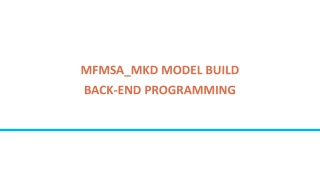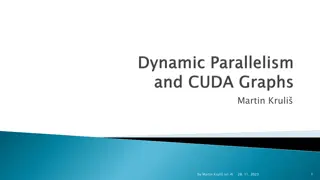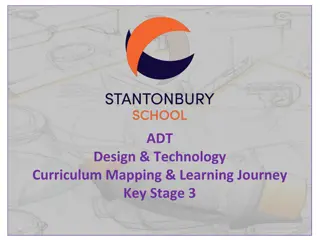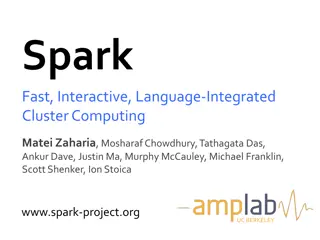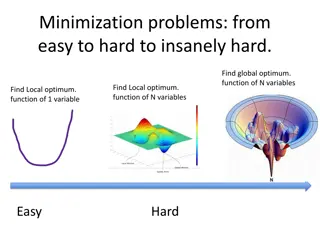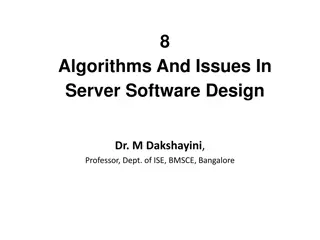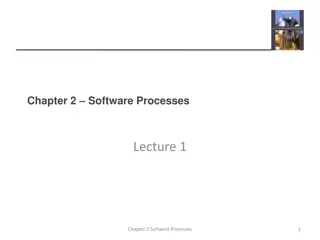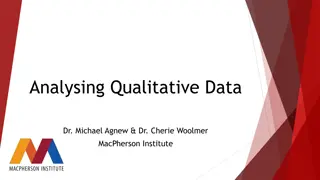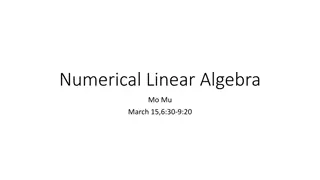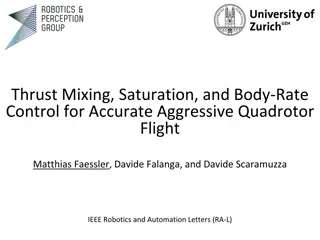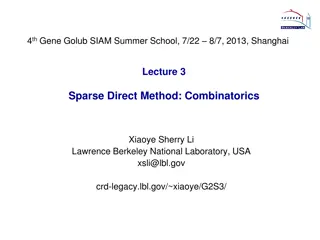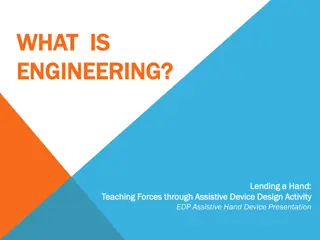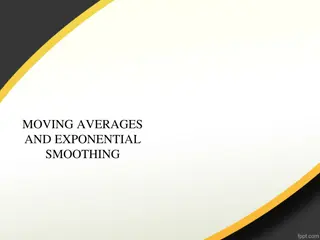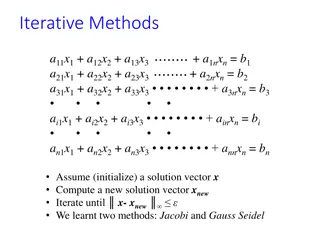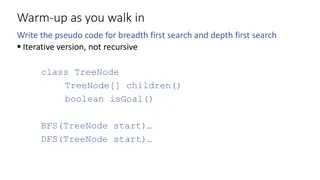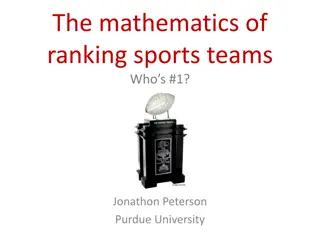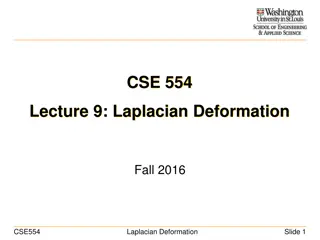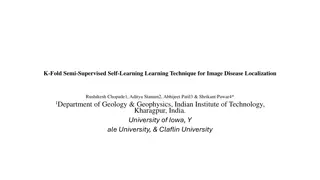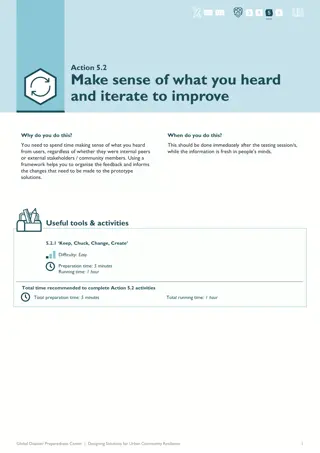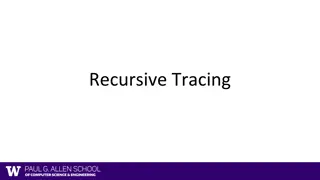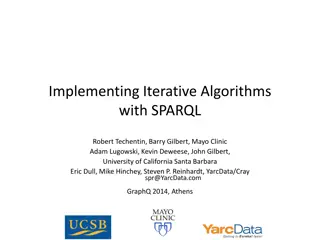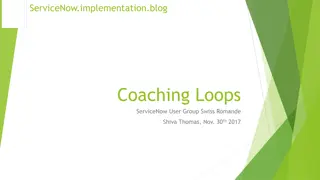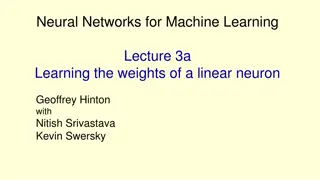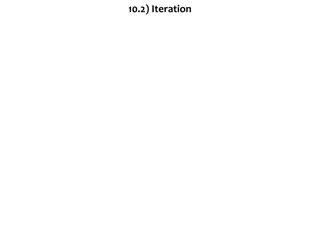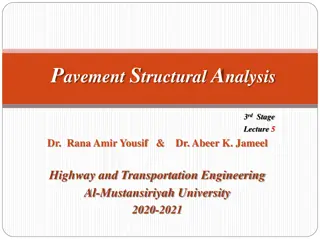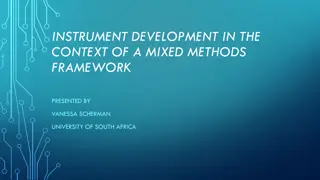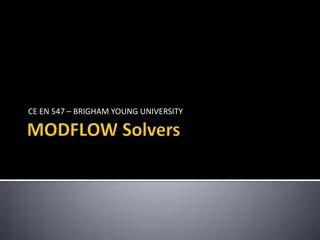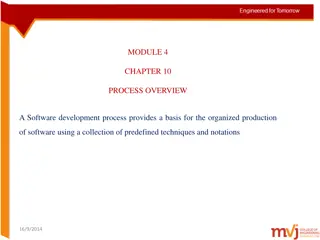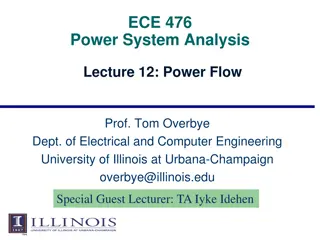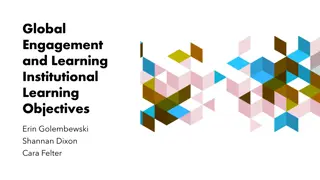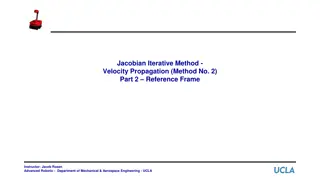Modern End-to-End Programming: Data Preparation, Model Building & Debugging
Prepare, build, debug models covering historical data. Make assumptions, solve equations, ensure data, economic consistency. Iterative processes for accurate simulations.
3 views • 10 slides
GCSE Design Technology Knowledge Organiser and Course Structure Overview
In this detailed knowledge organiser, find information about the GCSE Design Technology course structure, learning objectives, mission statement, and core technical principles for KS4 students. The course emphasizes iterative design cycles, creative thinking, problem-solving, and addressing environm
7 views • 53 slides
Understanding Parallelism in GPU Computing by Martin Kruli
This content delves into different types of parallelism in GPU computing, such as task parallelism and data parallelism, along with discussing unsuitable problems for GPUs and providing solutions like iterative kernel execution and mapping irregular structures to regular grids. The article also touc
1 views • 39 slides
Root Cause Analysis for Campaign Challenges
Root Cause Analysis (RCA) is a problem-solving method used to identify underlying causes of key process challenges in campaigns. It helps in learning from bottlenecks and successes to improve future outcomes. This analysis involves understanding what happened, why it happened, and what actions can b
7 views • 18 slides
Crafting Success How Effective Persona Creation Drives Design Success
Consagous Technologies UI UX Experts has ability to create experiences that resonate with users on a deep and personal level. Effective persona creation is the cornerstone of this success, enabling designers to understand their audience, guide design decisions, foster empathy, and drive iterative im
2 views • 2 slides
What is Email Marketing?
Email marketing is a cornerstone of digital marketing, leveraging targeted email communication to engage subscribers and drive desired outcomes. By crafting compelling content, personalized messages, and strategic segmentation, businesses can cultivate meaningful relationships with their audience. B
1 views • 7 slides
Design & Technology Learning Journey at Key Stage 3
Explore the ADT Design & Technology Curriculum Mapping and Learning Journey at Key Stage 3, focusing on the iterative design process. Dive into the essential concepts, skills, and experiences that students will encounter in this engaging educational pathway.
0 views • 26 slides
Understanding Apache Spark: Fast, Interactive, Cluster Computing
Apache Spark, developed by Matei Zaharia and team at UC Berkeley, aims to enhance cluster computing by supporting iterative algorithms, interactive data mining, and programmability through integration with Scala. The motivation behind Spark's Resilient Distributed Datasets (RDDs) is to efficiently r
0 views • 41 slides
Optimization Techniques for Minimization Problems
Explore various minimization problems, from easy to insanely hard, and learn about finding global and local optima using approaches like bisection, Newton's method, and rationalization. Discover efficient methods such as the golden section and iterative approximation with Newton's method for optimiz
0 views • 17 slides
Issues and Algorithms in Server Software Design
The content discusses fundamental issues in server software design such as connectionless vs. connection-oriented access, stateless vs. stateful applications, and iterative vs. concurrent server implementations. Various server algorithms like iterative and concurrent servers are explained with their
3 views • 44 slides
Understanding Software Processes and Models
Software processes are structured activities essential for software system development, involving specification, design, validation, and evolution. Various process models and approaches like the Rational Unified Process and agile methods are discussed, highlighting the importance of adaptability in
2 views • 105 slides
Strategic Tourism Demand Forecasting Methods
The chapter delves into qualitative and quantitative approaches for tourism demand forecasting, including the Delphi method and executive opinion juries. It explores advanced forecasting methods and the application of big data analytics in the tourism industry. The focus is on generating expert opin
1 views • 39 slides
Understanding Qualitative Data Analysis Methods
Exploring qualitative data analysis techniques such as Grounded Theory, Structured Coding, Thematic Analysis, and using tools like Nvivo to analyze large datasets. Emphasis is placed on ensuring rigor through iterative processes, understanding biases, and cross-checking themes for trustworthiness.
0 views • 7 slides
Comprehensive Overview of Numerical Linear Algebra Methods for Solving Linear Systems
Explore numerical linear algebra techniques for solving linear systems of equations, including direct and iterative methods. Delve into topics like Gaussian elimination, LU factorization, band solvers, sparse solvers, iterative techniques, and more. Gain insights into basic iterative methods, error
6 views • 12 slides
Advanced Techniques for Quadrotor Flight Control
The research paper discusses thrust mixing, saturation, and body-rate control for precise and aggressive quadrotor flight. It covers system overview, dynamical system modeling, LQR control design, trajectory tracking performance, disturbance rejection, body torque estimation, and iterative thrust mi
0 views • 14 slides
Understanding Methods of Social Work
Methods of social work encompass various approaches aimed at enhancing social functioning and addressing problems in individuals and communities. These methods are categorized into primary and secondary methods, each serving different purposes in the field. Primary methods involve direct interaction
0 views • 20 slides
Robust Parity Test for Extracting Parallel Vectors in 3D
Fundamental primitives for visualizing 3D data include line features like ridges and valleys of a scalar field, stream lines of a vector field, vortices of a velocity field, and extremal curves of a tensor field. Parallel Vectors (PV) provide a unified representation of 3D line features, forming con
0 views • 27 slides
Overview of Sparse Linear Solvers and Gaussian Elimination
Exploring Sparse Linear Solvers and Gaussian Elimination methods in solving systems of linear equations, emphasizing strategies, numerical stability considerations, and the unique approach of Sparse Gaussian Elimination. Topics include iterative and direct methods, factorization, matrix-vector multi
0 views • 35 slides
Understanding Engineering: Concepts and Processes
Engineering is the application of science, math, and technology to design solutions for everyday problems, benefiting society. The Engineering Design Process (EDP) involves defining problems, researching, brainstorming solutions, building prototypes, testing, communicating designs, and redesigning a
0 views • 28 slides
Understanding Moving Averages and Exponential Smoothing Methods
Forecasting methods like moving averages and exponential smoothing are essential for analyzing time series data. Averaging methods involve equally weighted observations, while exponential smoothing methods assign unequal weights that decay exponentially. Both methods can be useful for forecasting in
0 views • 18 slides
Understanding Iterative Methods in Linear Algebra
Explore the concepts of iterative methods such as Jacobi and Gauss-Seidel for solving systems of linear equations iteratively. Understand conditions for convergence, rate of convergence, and ways to improve convergence speed. Delve into iterative schemes in matrix forms, convergence criteria, eigenv
0 views • 39 slides
AI Search Algorithms: BFS and DFS Pseudo-code Iterative Version
Explore the iterative versions of Breadth First Search (BFS) and Depth First Search (DFS) with pseudo-code examples implemented for class TreeNode. Understand the concept of TreeNode, children() function, isGoal() method, and apply BFS and DFS starting from TreeNode start.
0 views • 53 slides
The Mathematics of Ranking Sports Teams - Insights and Methods
Exploring the importance and challenges of ranking sports teams, this content delves into various ranking methods, including statistical and mathematical approaches like the Colley Matrix, highlighting the complexities and iterative processes involved in determining team rankings.
0 views • 27 slides
Understanding Multiple Sequence Alignment Methods and Motivation
Multiple Sequence Alignment (MSA) involves aligning three or more biological sequences to reveal evolutionary relationships and subtle similarities. Various methods like Dynamic, Greedy, Progressive, and Iterative approaches are used to overcome challenges in MSA. The motivation behind MSA includes
0 views • 20 slides
Laplacian Deformation in Engineering and Applied Science
Laplacian deformation is a technique used in non-rigid registration to account for shape variance and improve fitting between source and target shapes. This method involves minimizing the distance and distortion terms to achieve accurate alignment. Intrinsic and extrinsic methods are discussed, wher
0 views • 53 slides
Enhancing Image Disease Localization with K-Fold Semi-Supervised Self-Learning Technique
Utilizing a novel self-learning semi-supervised technique with k-fold iterative training for cardiomegaly localization from chest X-ray images showed significant improvement in validation loss and labeled dataset size. The model, based on a VGG-16 backbone, outperformed traditional methods, resultin
0 views • 5 slides
Iterative Feedback Framework for Prototype Improvement
The iterative feedback framework involves making sense of user feedback using the Keep, Chuck, Change, Create (KCCC) model to iterate and enhance prototype solutions. This process helps organize input from testing sessions, informing necessary modifications for better outcomes. The framework emphasi
1 views • 26 slides
Understanding Recursive and Iterative Factorials through Tracing
This content provides an in-depth exploration of recursive and iterative factorial functions through tracing examples. The explanations are accompanied by visual aids to help conceptualize the iterative and recursive processes of calculating factorials. By comparing the two methods side by side, rea
0 views • 7 slides
Implementing Iterative Algorithms with SPARQL
This comprehensive guide explores the implementation of iterative algorithms with SPARQL, focusing on YarcData/Cray's approach to using these algorithms. It covers YarcData's interest in graphs, the Urika appliance, iterative algorithms in machine learning, implementation approach, and algorithms im
1 views • 12 slides
Understanding Coaching Loops for Improved Performance
Coaching loops are a method of enhancing performance by providing iterative feedback to guide individuals towards high performance. Unlike traditional feedback methods, coaching loops allow for real-time influence on the process outcome, improving overall effectiveness. By implementing the Kepner-Tr
0 views • 24 slides
Understanding Neural Networks for Machine Learning
Explore the learning process of linear neurons, why the perceptron learning procedure cannot be generalized to hidden layers, and the importance of iterative methods in solving complex problems in the context of neural networks. The content delves into the minimization of errors, the use of real-val
0 views • 34 slides
Iterative Root Approximation Using Natural Logarithm
The content covers iterative root approximation using natural logarithm in solving equations. It explores finding roots by iterative formulas and demonstrates calculations to reach approximate values. The process involves selecting intervals to show correct values and ensuring continuity for accurat
0 views • 14 slides
Nonlinear Analysis of Pavement Structural Stresses and Deflections
Explore the effect of nonlinearity in granular materials on vertical stresses and deflections in pavement structural analysis. Learn about iterative methods and stress invariants to understand pavement behavior under traffic loads. Discover the application of Boussinesq's solutions and Burmister's l
0 views • 20 slides
Instrument Development in Mixed Methods Framework by Vanessa Scherman
Mixed methods research presented by Vanessa Scherman from the University of South Africa explores the development of instruments within a mixed methods framework. The content covers an overview of mixed methods, methodological norms, instrumental development, and closing the loop. It discusses the i
0 views • 40 slides
CSE 122 Spring 2023: ArrayList Lecture Overview and Example Program - Movie Favorites
In this CSE 122 lecture for Spring 2023, the instructors Tristan Huber and Hunter Schafer introduced ArrayLists, covered announcements, and presented a practice problem highly relevant for the course. They discussed the addAll method, techniques for functional decomposition, and key skills for itera
0 views • 14 slides
Understanding Iterative Solvers in MODFLOW
In this content, you will learn about the working of iterative solvers, solver parameters, troubleshooting convergence issues, and various solver algorithms in MODFLOW. The iterative tweaking of starting head values, different solver codes like SIP, PCG2, GMG, and their characteristics are explained
0 views • 21 slides
Software Development Process Overview
A software development process provides a structured approach for creating software using predefined techniques and stages such as system conception, analysis, system design, class design, implementation, testing, training, deployment, and maintenance. It involves stages like domain analysis, applic
0 views • 39 slides
Power System Analysis: Lecture on Power Flow
Lecture 12 on Power Flow Analysis in Power Systems covers the use of power balance equations when analyzing complex power consumption and generation. It explains the derivation of real power balance equations for iterative solutions in power flow analysis. The lecture highlights the need for iterati
0 views • 30 slides
Global Engagement and Learning Institutional Objectives Overview
This content introduces the institutional learning objectives of a global engagement and learning institution, focusing on graduates' exposure to interrelationships among self, local, and global communities, reflection of self-perspective and cultural diversity awareness, integration of world perspe
0 views • 9 slides
Understanding Jacobian Iterative Method for Velocity Propagation
Explore the Jacobian Matrix and its applications in velocity propagation for robotics. Learn about recursive expressions, differentiation methods, and handling linear and angular velocities in different frames of reference. Delve into the dynamics of a 3R robot example and grasp the concept of Jacob
0 views • 26 slides
